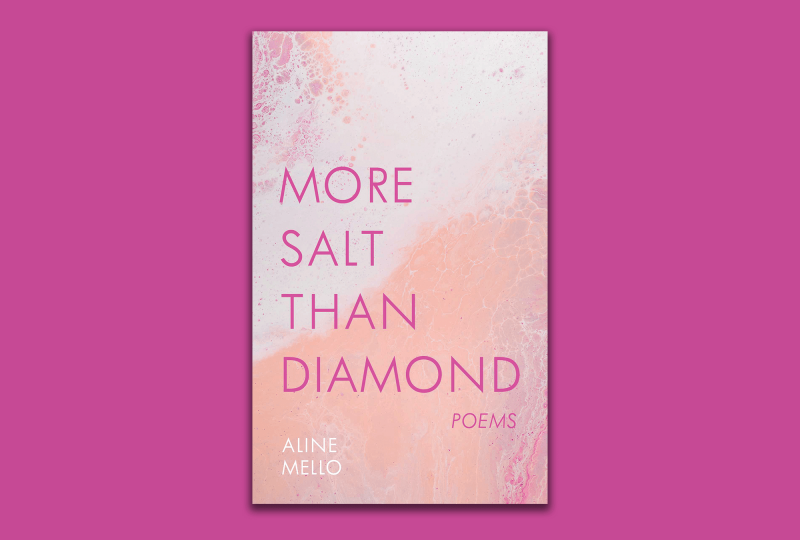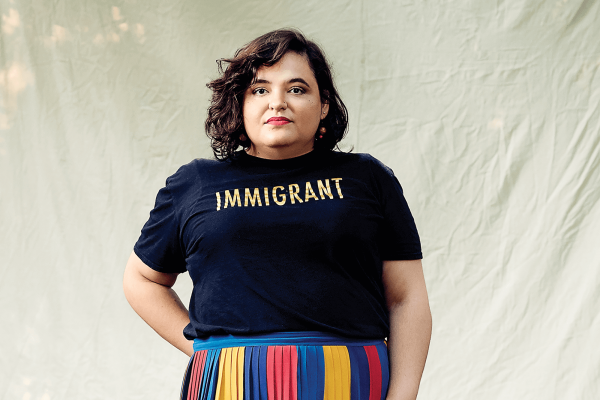ALINE MELLO WAS 7 years old when she left Brazil with her parents and sister for what was supposed to be a short-term stay in the United States. Growing up undocumented, Mello turned to writing to process her questions about belonging and relationships. More Salt than Diamond (Andrews McMeel Publishing), her debut poetry collection, pulses with themes of identity, religion, and living as an immigrant in tumultuous times. Sojourners columnist Liuan Huska spoke with Mello, a graduate fellow in creative writing at Ohio State University, about race, language, and coming back around to God after disillusionment with the church.
Liuan Huska: What were the circumstances of your family’s emigration from Brazil?
Aline Mello: We emigrated in 1997. We were pretty poor. We had a lot of faith that if we were going to the U.S., it was because God wanted us to go. My uncle got a tourist visa for the four of us to go to Somerville, Mass. It was just going to be three years.
My father had this thing where he would follow charismatic pastors, and we followed one to Atlanta in 2000, right before 9/11. I had been told [incorrectly], “If you stay here for 10 years, you automatically get papers.” I thought, “Okay, I’m going to be fine.”
Right when I graduated high school, in 2007, my father left us. My mom literally got home from work one day and got a voice mail from him saying, “Hey, I left the country.” I realized I couldn’t go to college in Brazil because I didn’t know college-level Portuguese. And I had scholarships here. The goal was to go to college and then go back. Then DACA [Deferred Action for Childhood Arrivals] happened. So I thought, “Obviously, God wants me to stay.” You keep getting scraps enough [that] you don’t starve.
What do you mean by “getting scraps”? I grew up in Brazilian church through when I was 17. I was one of the true believers. I didn’t date. I followed all the rules. I would give myself extra rules. It was the whole concept of “less of me, more of You.” Trying to remove any trace of self and personality. With being undocumented, it felt like, “As soon as I learn the [spiritual] lesson, God’s going to change my circumstance.”
How have you renegotiated your relationship with God since then? When Donald Trump started his campaign, I started telling people about my immigration status. Living in Georgia, in the South, I saw people supporting Trump. I figured, “People just don’t know, and as soon as they know they’ll change their minds.”
I was devastated when he won. I felt like I had personally failed. I didn’t convince enough people. For a long time, I thought, “Maybe God is a Republican. Maybe God doesn’t want immigrants. Maybe God is a white man. Maybe this is it.”
That’s terrifying. It was so heartbreaking. I tried to pare my faith down to Jesus. There was no way Jesus would not be affirming of LGBTQ people. I cannot imagine Jesus walking around looking at marginalized groups and further marginalizing them. It’s only been for the past year that I feel I’m in a safe enough space to realize that maybe I do believe in God. But I only refer to God as a “she” in therapy.
I hate the idea that you do all these things [to self-sacrifice], and God says, “Ew, dirty rags.” If God is really good, God is saying, “Aline, I see all that you’ve done; they’re not dirty rags. I keep them; they’re all valuable. But you don’t have to do any more. I want you to be yourself and enjoy your life.”
Brazil’s national elections will be in October, and President Jair Bolsonaro, who is running for another term, is deploying some tactics used by Trump, such as claiming the voting system is vulnerable to fraud. What similarities do you see between Brazil and the U.S.? I don’t think my body can hold onto two countries-worth of politics. But the law is that all Brazilians must vote, or you pay a fine. I’m going to vote for Lula [Luiz Inácio Lula da Silva, currently Bolsonaro’s leading opponent]. I’m considered a white Brazilian, and I’m very aware of the power I have when I’m in Brazil. I need to do what I’d like white Americans to do, or else I’m a hypocrite.
You’re brown in the U.S., but white in Brazil? It’s strange. There’s a poem in my book about when I had to tell my mom that she wasn’t white. For older Brazilians who move here, it’s a more jarring thing. But for me, since I grew up brown, I’m constantly aware of my marginalization—brown, immigrant, woman, undocumented. In Brazil, I have to do a reset and remind myself I’m white there.
I grew up around Latinos who were Spanish speaking. I speak Spanish because I studied it, but it’s not my first language. I want my Mexican friends to also know stuff in Portuguese. I’ve always had to navigate—“I’m one of you, but not one of you.” It’s messy because of whiteness.
mello_book.png

Do you write poems in Portuguese? Everything I’ve ever written in Portuguese has been religious. I have always read the Bible in Portuguese. I used to write Portuguese psalms and sermons. It’s almost like I associate Portuguese with religion and English with worldliness. Especially because becoming “Americanized,” in a lot of the Brazilian church’s perspective, is to become further from God. I’m trying to write my first Portuguese poem right now. I’m sure there’s something there to be unlocked.
I love your poem “In the Reunion of All My Selves.” I relate to the longing for wholeness and feeling of fragmentation, especially the line, “the women who are me do not ask each other questions.” Do your separate selves ever come together? Very few times. The last time, I was meeting with my classmates here in Columbus [Ohio]. We went to someone’s house; at first I was feeling cautious. Five of us were sitting around a table eating a big salad with purple cabbage, avocado, and eggs, talking about our lives and what brought us to writing. Looking back, I realized that I was not aware of myself at all. I was just in the moment.

Got something to say about what you're reading? We value your feedback!







